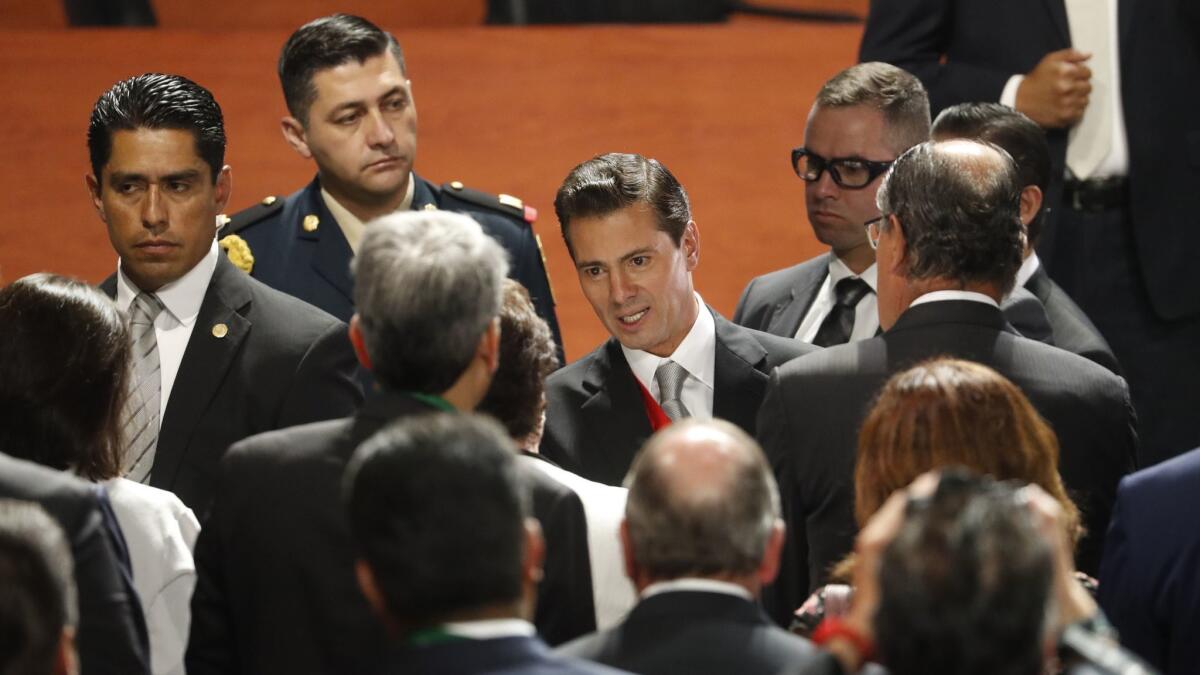Outgoing Mexican President Enrique Peña Nieto concedes that ‘peace’ was not achieved

- Share via
Reporting from Mexico City — Mexican President Enrique Peña Nieto delivered his final state of the union address Monday, conceding that he had not achieved his goal of bringing “peace” to the violence-racked nation.
“We did not realize the objective of recovering peace and security for Mexicans in all corners of the country,” Peña Nieto told lawmakers, ministers and others gathered in downtown Mexico City at the ceremonial National Palace.
Public opinion surveys have shown that rising crime is a near-ubiquitous concern among Mexicans, and contributed to Peña Nieto’s dismal approval ratings and the overwhelming defeat of his party in elections on July 1. The vote was widely seen here as a referendum on his administration, which has also struggled to deliver economic growth and combat corruption.
Peña Nieto, a telegenic former governor of Mexico state, took office in 2012 vowing to “bring peace to Mexico.” He is leaving office with crime on the rise and a broad perception that his administration was a failure.
The country recorded more than 25,000 homicides last year — the highest number since officials began publishing such data two decades ago.
In his almost 90-minute address, the president declared that initial success during his term in battling organized crime had prompted a “resurgence” of smaller gangs that overwhelmed police efforts.
Authorities here have long conceded that well-armed, powerful organized crime syndicates — which control lucrative drug-trafficking routes to the United States and other illicit activities — faced little pushback from low-paid, ill-trained and corruption-ridden police forces.
“The strengthening of local police is indispensable for the promulgation of a genuine state of law,” the president said, adding that such an effort would require a “sustained, long-term” investment of public resources.
Like the last several leaders who preceded him, Peña Nieto did little to shift power from the criminals to the police.
In the absence of effective police forces, Mexico has instead deployed the military to fight cartels and other criminal syndicates during the last decade. It has been an extremely controversial strategy, and one of questionable effectiveness.
Though the military deployment has aided in the arrests or killings of many organized crime kingpins, the presence of troops on the streets has not substantially reduced crime or violence. Military units have also been implicated in alleged massacres and other human rights abuses. And the removal of capos has fractured criminal gangs into smaller groups but not eliminated them.
Nonetheless, President-elect Andres Manuel Lopez Obrador has signaled that he plans to continue deploying the Mexican military in an anti-crime role. It would be “irresponsible” to send soldiers and marines back to their barracks at a time when police were not prepared to deal with the threat, Lopez Obrador told reporters last month.
While acknowledging a failure to achieve peace, Peña Nieto, who leaves office on Dec. 1, also detailed what he termed his administration’s successes in a number of realms, including the renegotiation of a new bilateral trade pact last week with the United States, the destination of almost 80% of Mexico’s exports.
The president voiced the hope that Canada would eventually join in a revised version of the current North American Free Trade Agreement, which governs more than $1 trillion in annual trade between the United States, Mexico and Canada.
Peña Nieto also also extolled Mexico’s “stability” during his almost six years in office, its holding of national elections, what he termed a moderate national debt and what he called the country’s commitment to human rights, both at home and in countries such as Venezuela.
His comments amounted to a kind of farewell to public life after almost six years in office, though Peña Nieto vowed to work hard in his final weeks. He thanked his supporters, his family and others before walking off stage to prolonged applause.
But history may not treat Peña Nieto kindly.
The presidential candidate of his Institutional Revolutionary Party — which dominated Mexican politics for much of the 20th century — finished a distant third. The party known as the PRI also suffered historic setbacks in congressional, gubernatorial and local voting.
Mexican presidents are restricted to one term, so Peña Nieto was not a candidate in the July contest. But the outcome was still mortifying for him. His election in 2012 had raised hopes of a revival for the PRI, which had been out of presidential power since the 2000 elections.
His successor, Lopez Obrador, has already pledged to cancel or review some of Peña Nieto’s major initiatives, including education and energy reforms and a multibillion-dollar plan for a new international airport outside the capital.
But the relationship between the two appears to have warmed considerably since 2012, when Lopez Obrador was defeated by Peña Nieto in presidential balloting and refused to acknowledge the result, alleging fraud.
Peña Nieto has extended a hand to the incoming administration and said Monday that he wished great “success” for the president-elect.
And Lopez Obrador, a leftist populist and former PRI stalwart who has vowed a broad “transformation” of Mexican society, has publicly thanked Peña Nieto for his cooperation during the transition period.
Twitter: @PmcdonnellLAT
More to Read
Sign up for Essential California
The most important California stories and recommendations in your inbox every morning.
You may occasionally receive promotional content from the Los Angeles Times.













